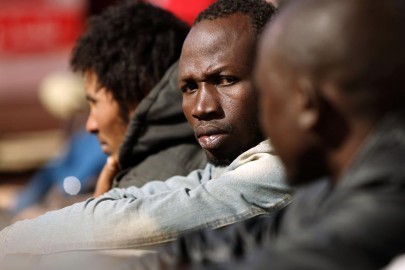Dozens of Nigerian migrants freed from indentured servitude in Libya are now returning home and have recounted abuses suffered at the hands of traffickers, jailers and bosses who bought them or rented them as slaves.
The Nigerians, who spent years in Libya trying to buy their way to freedom and across the Mediterranean to Europe, told the BBC how they were raped, starved, beaten and sold as slaves in the war-ravaged country.
Stories of black slavery in Libya have emerged frequently over the last two yearsafter a NATO-backed intervention in the North African nation toppled 40-year leader Muammar el-Qaddafi in 2011. The bloody civil war that followed years later has led to an explosion in people-trafficking in the country and a clandestine slave trade.
The Nigerians, returning home via Benin, where they have been taken by the United Nations International Organization for Migration, explained how the town of Gharyan, in Libya’s mountainous west, had become a hub for indentured servitude. After individuals crossed illegally into Libya, they would be taken to the local prison where they were sold or leased as slaves.
“They come to our caravans [cells], they pick six persons to do their dirty jobs, to do farming, brick-laying work,” Lucky Akhanene recounted of his experience. “They give us out to their friends. They don’t pay us. It’s just hard labor. If you’re not fast with your job, you get beaten,” he added.
Jackson Uwumarogie, who was arrested on the Mediterranean trying to flee Libya, said he was sold with 20 men for a price roughly equivalent to $735. On a farm where he harvested onions and fed cattle, he was only given food every few days and seawater to drink. Other Nigerians also described eating insubstantial meals and having to drink water from toilets to survive.
Another man, Mac Agheyere, described how he was held in bondage by a boss who owned some beach huts and a car wash by the sea. When Agheyere refused to work for no money, eventually he was abused and taken back to the prison. “He beat me with an iron bar,” Agheyere said. “They took barbed wire and tied my hands and my feet and threw me inside a car and took me back to prison.”
Gharyan, 60 miles south of Tripoli, is held by militias loyal to Libya’s U.N. Government of National Accord. The paramilitary groups, which have controlled Libya since the country’s revolutionary war, have been vying for power by fighting turf wars, often battling for control of lucrative smuggling routes and making travel dangerous.
The European Union has sought to create a buffer in Libya to stop migrants and refugees from arriving, predominantly in Italy. However, the policy has increased the number of people now languishing in Libyan prisons who could become victims of the slave trade. Zeid bin Ra’ad al-Hussein, the United Nations human rights chief, has described the policy as “inhumane.”
source: Newsweek
Ask me anything
Explore related questions





